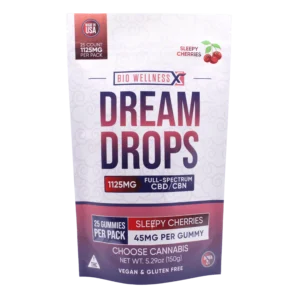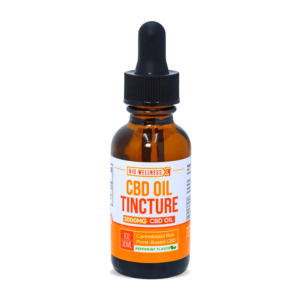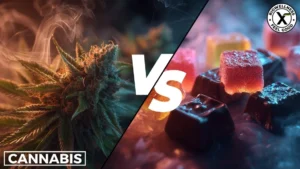key points
Is there a right choice between full-spectrum and broad-spectrum CBD for sleep products?
The answer isn’t straightforward. While most ingestible CBD products can help you relax and fall asleep, some have additional ingredients specifically for sleep. Others contain more potent cannabinoids like THC, which can enhance relaxation.
To help you decide which CBD formula and products are right for you, we’ve compiled some helpful information.
How Can CBD Products Help You Sleep Better at Night?
CBD oil and other cannabinoids from hemp offer a range of benefits depending on how they’re used. CBD interacts with your endocannabinoid system (ECS) through cannabinoid receptors (CB1 and CB2), providing a variety of effects, such as:
1. Reducing Anxiety and Stress
One of the primary reasons people struggle with sleep is anxiety and stress. CBD has been shown to have anxiolytic (anxiety-reducing) properties. By interacting with cannabinoid receptors in the brain, CBD can help calm the nervous system, reduce feelings of anxiety, and promote relaxation, making it easier to fall asleep and stay asleep.
2. Managing Physical Discomfort and Inflammation
Chronic discomfort and inflammation are common culprits of sleep disturbances. CBD is known for its anti-inflammatory and analgesic properties. By reducing aches, soreness, and inflammation, CBD can help individuals experience less discomfort during the night, leading to improved sleep quality.
3. Regulating Sleep-Wake Cycles
The endocannabinoid system (ECS) is involved in maintaining the sleep-wake cycle. CBD’s interaction with the ECS can help regulate sleep patterns, promoting a more consistent and restorative sleep cycle. This can be particularly beneficial for individuals with irregular sleep schedules or conditions like insomnia.
4. Alleviating Insomnia Symptoms
Studies have shown that CBD may help alleviate symptoms of insomnia. By addressing underlying issues such as anxiety, muscle soreness, and stress, CBD can help individuals fall asleep faster and enjoy longer, more restful sleep. Some research suggests that higher doses of CBD before bedtime can increase overall sleep duration and improve sleep quality.
5. Enhancing Sleep Quality
CBD may enhance the overall quality of sleep by promoting deeper and more restful sleep stages. Users often report experiencing fewer interruptions during the night and waking up feeling more refreshed and rejuvenated. This can lead to better daytime functioning and overall well-being.
6. Supporting Mental Health
Mental health conditions like depression and anxiety can significantly impact sleep. CBD’s potential mood-stabilizing effects can help improve mental health, indirectly supporting better sleep. By promoting a sense of calm and reducing symptoms of mental health disorders, CBD can contribute to a healthier sleep routine.
7. Reducing Nighttime Awakenings
High levels of cortisol, the stress hormone, can cause frequent awakenings during the night. CBD may help lower cortisol levels, reducing these awakenings and promoting uninterrupted sleep.
The Cannabis sativa plant contains over 100 cannabinoids, each interacting with your cannabinoid receptors differently. Some cannabinoids work with one receptor, while others interact with both or even oppose one.
What Is the Difference Between Broad-Spectrum CBD and Full-Spectrum CBD?
Both full-spectrum and broad-spectrum CBD products contain similar formulas, but for better sleep quality, focus on how they interact with the CB1 receptors in your central nervous system (CNS). Your CNS controls motor activity, pain perception, and mood, all of which affect sleep quality.
CBD interacts with both CB1 and CB2 receptors. When combined with ingredients like melatonin, valerian root, chamomile, and hops in our CBD PM sleep aid formulas, the benefits for your CB1 receptors are optimized. Full-spectrum CBD includes other cannabinoids, most notably THC, which differentiates it from broad-spectrum CBD for sleep products.
At BioWellnessX, all of our full-spectrum and broad-spectrum CBD products are thoroughly tested by third-party, ISO-certified labs. The key difference is how the presence and levels of various cannabinoids trigger the entourage effect.
The Entourage Effect
While the entourage effect is a popular concept among many experts, it remains a theory rather than a proven fact. This doesn’t mean it doesn’t exist, just that it hasn’t been definitively confirmed. So, what exactly is the entourage effect?
In simple terms, the entourage effect describes how various chemicals in our bodies can work together to produce greater benefits than they could alone. Cannabinoids and terpenes, in particular, can interact to create this synergistic effect.
You don’t need THC to trigger the entourage effect. Using a CBD product with more than one cannabinoid can start the entourage effect. However, the effects and benefits without THC will be less than with a product containing the full range of cannabinoids.
Broad-spectrum CBD oil contains a variety of cannabinoids and terpenes from the hemp plant, but it does not contain THC. This allows you to experience the entourage effect without any THC-related concerns. High-quality broad-spectrum CBD oil includes a range of cannabinoids from the Cannabis sativa plant, although not all of them. It is THC-free, so you can still experience the entourage effect, but you may not receive all potential benefits.
Benefits of Full Spectrum CBD
Entourage Effect:
The presence of THC and other cannabinoids can enhance the overall effectiveness of the product.
Comprehensive Relief:
Full-spectrum CBD products are often recommended for those seeking comprehensive benefits, such as improved sleep, physical relief, and reduced anxiety.
Therapeutic Benefits:
The combination of cannabinoids and terpenes provides a wide range of therapeutic benefits, making it suitable for various conditions, including sleep disturbances.
Drawbacks
Drug Testing:
The trace amounts of THC in full-spectrum CBD may lead to a positive drug test, which can be a concern for some users.
Psychoactive Effects:
Although the THC content is minimal, some users may still be sensitive to its psychoactive effects.
Benefits of Broad Spectrum CBD
No THC:
Broad-spectrum CBD retains all the beneficial compounds of the hemp plant except THC, making it a safer option for those who need to avoid THC due to drug testing or sensitivity.
Entourage Effect:
Users can still benefit from the entourage effect, enhancing the therapeutic potential for sleep improvement and other health concerns.
Versatility:
Broad-spectrum CBD products are suitable for a wide range of users, including those who are sensitive to THC or need to avoid it for legal or professional reasons.
Drawbacks
Less Potent Entourage Effect:
Without THC, the entourage effect may not be as strong as with full-spectrum CBD.
Processing:
The extra processing to eliminate THC can sometimes impact the overall cannabinoid profile, potentially reducing effectiveness for certain users.
Full Spectrum vs Broad Spectrum CBD for Sleep: Which Is Better?
Choosing between full-spectrum CBD and broad-spectrum CBD for sleep often comes down to personal preference. If you’re okay with the 0.3% THC in full-spectrum products, try different options to see which works best for you.
Understanding the differences and benefits of full-spectrum vs. broad-spectrum CBD can make the decision challenging. Additionally, we’ve released a high-potency full-spectrum formula with more THC for those seeking extra strength.
Final Thoughts: Full-Spectrum or Broad-Spectrum CBD for Sleep
Both full-spectrum and broad-spectrum CBD offer unique benefits for improving sleep. Full-spectrum CBD provides the most comprehensive range of cannabinoids and terpenes, while broad-spectrum CBD offers a THC-free alternative. By understanding the differences and benefits of each type, you can make an informed decision to enhance your sleep and overall wellness.
Whether you choose full-spectrum or broad-spectrum CBD, incorporating these products into your wellness routine can help manage sleep disturbances, reduce anxiety, and improve your overall quality of life. Always consult with a healthcare professional before starting any new supplement to ensure it’s the right choice for your needs.

Legal Disclaimer:
By reading this information presented, you agree to release the author of any liability that comes from using this data. This post contains no legal advice. Claims about cannabinoids have not yet been approved by the FDA. Cannabis laws and regulations are subject to change. Read the full legal disclaimer here.
Other Topics You Might Want To Read:
- Delta-8 vs. Delta-10 For Pain: Which Works The Best?
- CBD for Vertigo – Discover the Potential
- Finding the Best CBN Gummies for Sleep Support
- What Are the Best Forms of CBN Available Today?
- Organic 50mg Delta-8 Gummies: Benefits and Effects
- CBG and CBD: Differences and Similarities
- What is Full Spectrum THC?
- 100mg Delta-8 THC Gummies Review From BioWellnessX
- Indica vs Sativa Edibles: What’s the Difference?
- Delta 8 Edibles Review And Where to Buy Them!
- Is Delta-8 or CBD Better For Pain? The Top 5 Differences!
References:
- Cannabidiol and Intestinal Motility
- Delta-8-THC: Delta-9-THC’s nicer younger sibling?
- Consumer Experiences with Delta-8-THC
- Hemp Production and the 2018 Farm Bill – 07/25/2019 | FDA
- The Controlled Substances Act (dea.gov)
FAQs About Full-Spectrum & Broad-Spectrum CBD
CBD isolates are pure CBD products that contain no other cannabinoids or plant compounds. They are a good option for those who want the benefits of CBD without any THC or other cannabinoids.
Full-spectrum CBD can offer a range of therapeutic benefits due to the presence of multiple cannabinoids and the entourage effect. It may help with pain relief, anxiety, and sleep disturbances by interacting with the body’s endocannabinoid system.
Yes, broad-spectrum CBD products can help manage chronic pain by interacting with the endocannabinoid system and offering therapeutic benefits, even without the presence of THC.
Consider your sensitivity to THC, desired therapeutic effects, and personal preferences. Full-spectrum CBD offers a complete range of cannabinoids, while broad-spectrum CBD excludes THC but still provides multiple cannabinoids for potential benefits.









